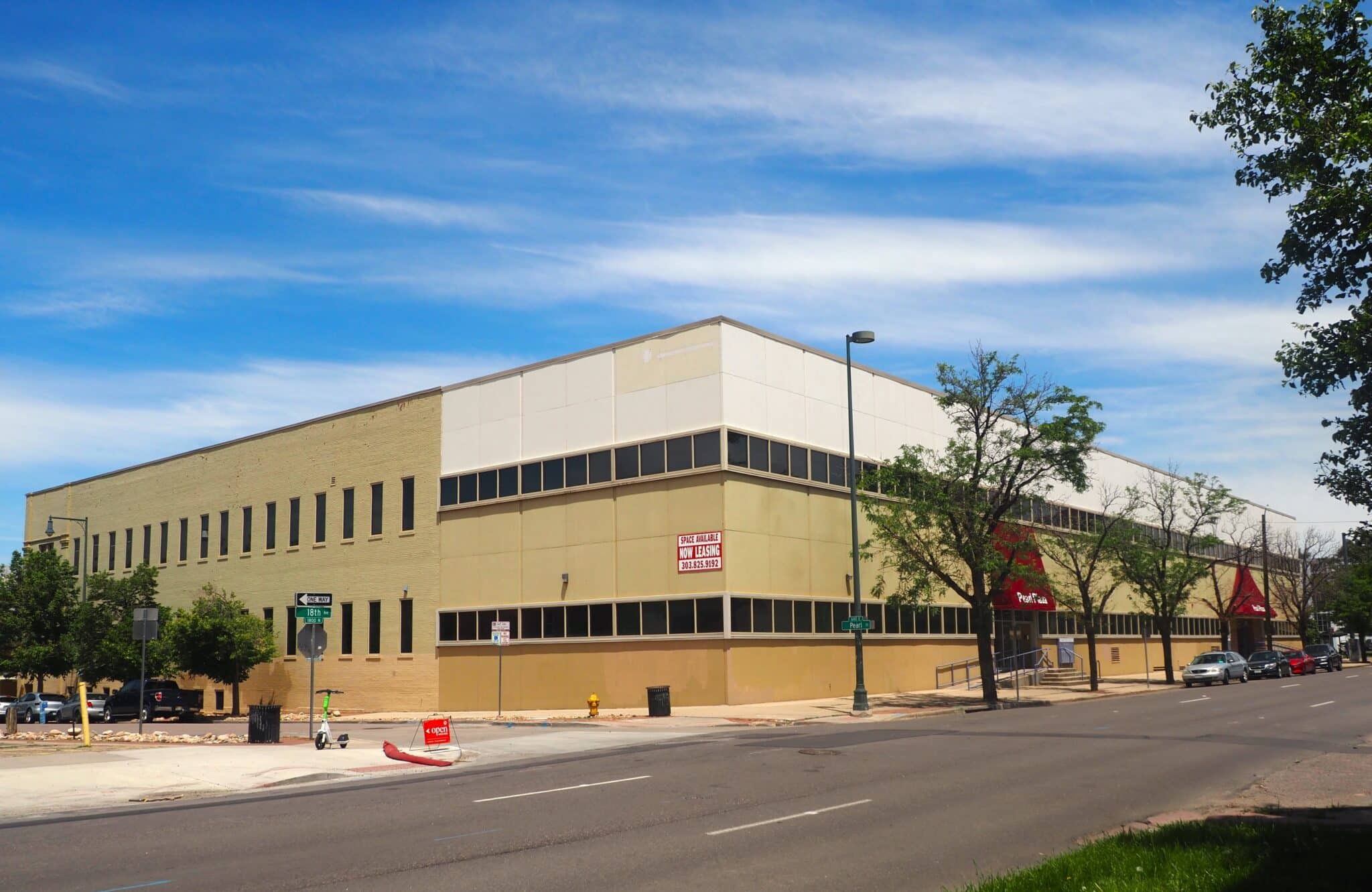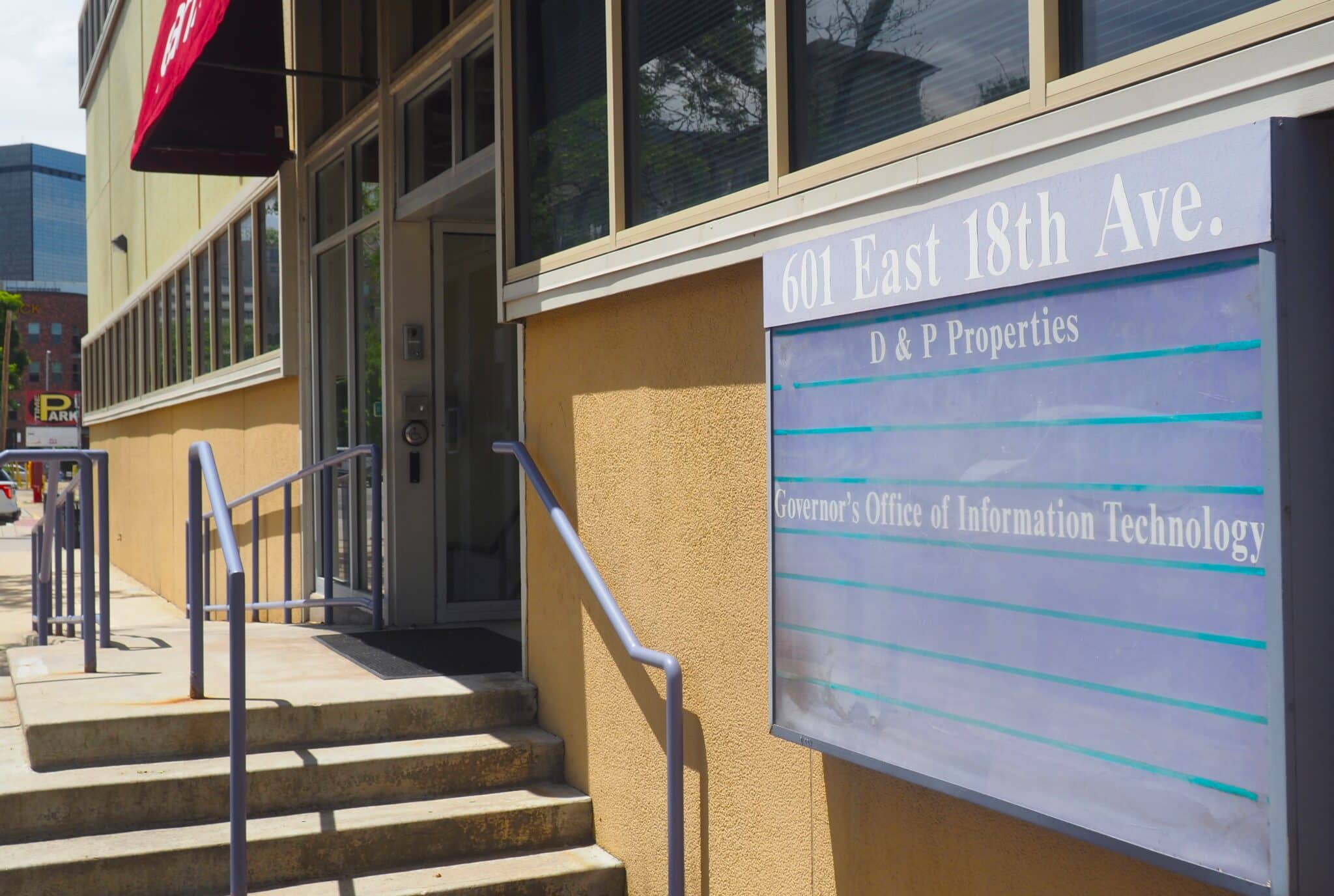
Pearl Plaza, at 601 E. 18th Ave. in Uptown, was the headquarters of the Governor’s Office of Information Technology between 2009 and February 2023. (Justin Wingerter/BusinessDen)
Last September, Colorado’s Office of Information Technology realized it had a problem.
Since 2009, the state agency had been leasing space in Pearl Plaza, an office building at 601 E. 18th Ave. in Uptown. But the vast majority of its employees were not working in those 95,000 square feet, since pandemic-era hybrid work had become the office’s post-pandemic policy.
In a September 2022 memo, which was attached to a lawsuit this week, OIT laid out its few options for the office space, which it was leasing until 2024: “1. Sublease, if possible” or “2. Do nothing.” The memo also listed a third, “non-viable” option: breaking the lease.
That last idea was not viable, according to the memo, because it was fall 2022. OIT leaders warned of the effect it might have on “votes in (an) election year” and “possible reputational damage” to OIT, which is formally known as the Governor’s Office of Information Technology. So, OIT chose option two: It did nothing until the election passed.
Then, unable to sublease its nearly 100,000 square feet of sparsely occupied office space, OIT came up with a plan, according to its landlord. Its lease contained a clause that allowed OIT to terminate in cases of “colocation” — or when the state is moving employees from several places into one space. So, OIT told its landlord in December that it would be colocating.
As a result, the state hasn’t paid Dikeou Realty, which owns Pearl Plaza, since moving out at the end of February, 13 months before its lease expired, according to Dikeou. The landlord sued OIT in Denver District Court on Wednesday, seeking back rent and future rent.

The Governor’s Office of Information Technology, a state agency, was still listed as a tenant on signage outside Pearl Plaza on June 8, 2023. (Justin Wingerter/BusinessDen)
“OIT was not ‘colocating,’” Dikeou wrote of OIT’s move to a state building at 1575 Sherman. “Most of its employees were now located all over the state (mostly in their homes), and the state was using the colocation provision for the purpose of drastically downsizing its office footprint.”
Brandi Wildfang Simmons, a spokeswoman for the Office of Information Technology, declined to comment on the lawsuit Thursday and deferred to the Colorado Attorney General’s Office. A spokesman for the Attorney General’s Office also declined to weigh in on the lawsuit.
Dikeou is represented by attorney Bill Kyriagis with the Denver law firm Otten Johnson Robinson Neff and Ragonetti. He declined to answer questions about the lawsuit, including what OIT’s monthly rent was and how much money his client believes it is now owed.
Dikeou said it hasn’t been able to find a tenant for Pearl Plaza since OIT left. The 125,000-square-foot building opened in 1937 and is assessed at $10.6 million, city records show.
The Dikeou family also owns a number of parking lots at the edge of downtown and Uptown, which they want the city to rezone to allow for taller structures.

Pearl Plaza, at 601 E. 18th Ave. in Uptown, was the headquarters of the Governor’s Office of Information Technology between 2009 and February 2023. (Justin Wingerter/BusinessDen)
Last September, Colorado’s Office of Information Technology realized it had a problem.
Since 2009, the state agency had been leasing space in Pearl Plaza, an office building at 601 E. 18th Ave. in Uptown. But the vast majority of its employees were not working in those 95,000 square feet, since pandemic-era hybrid work had become the office’s post-pandemic policy.
In a September 2022 memo, which was attached to a lawsuit this week, OIT laid out its few options for the office space, which it was leasing until 2024: “1. Sublease, if possible” or “2. Do nothing.” The memo also listed a third, “non-viable” option: breaking the lease.
That last idea was not viable, according to the memo, because it was fall 2022. OIT leaders warned of the effect it might have on “votes in (an) election year” and “possible reputational damage” to OIT, which is formally known as the Governor’s Office of Information Technology. So, OIT chose option two: It did nothing until the election passed.
Then, unable to sublease its nearly 100,000 square feet of sparsely occupied office space, OIT came up with a plan, according to its landlord. Its lease contained a clause that allowed OIT to terminate in cases of “colocation” — or when the state is moving employees from several places into one space. So, OIT told its landlord in December that it would be colocating.
As a result, the state hasn’t paid Dikeou Realty, which owns Pearl Plaza, since moving out at the end of February, 13 months before its lease expired, according to Dikeou. The landlord sued OIT in Denver District Court on Wednesday, seeking back rent and future rent.

The Governor’s Office of Information Technology, a state agency, was still listed as a tenant on signage outside Pearl Plaza on June 8, 2023. (Justin Wingerter/BusinessDen)
“OIT was not ‘colocating,’” Dikeou wrote of OIT’s move to a state building at 1575 Sherman. “Most of its employees were now located all over the state (mostly in their homes), and the state was using the colocation provision for the purpose of drastically downsizing its office footprint.”
Brandi Wildfang Simmons, a spokeswoman for the Office of Information Technology, declined to comment on the lawsuit Thursday and deferred to the Colorado Attorney General’s Office. A spokesman for the Attorney General’s Office also declined to weigh in on the lawsuit.
Dikeou is represented by attorney Bill Kyriagis with the Denver law firm Otten Johnson Robinson Neff and Ragonetti. He declined to answer questions about the lawsuit, including what OIT’s monthly rent was and how much money his client believes it is now owed.
Dikeou said it hasn’t been able to find a tenant for Pearl Plaza since OIT left. The 125,000-square-foot building opened in 1937 and is assessed at $10.6 million, city records show.
The Dikeou family also owns a number of parking lots at the edge of downtown and Uptown, which they want the city to rezone to allow for taller structures.
